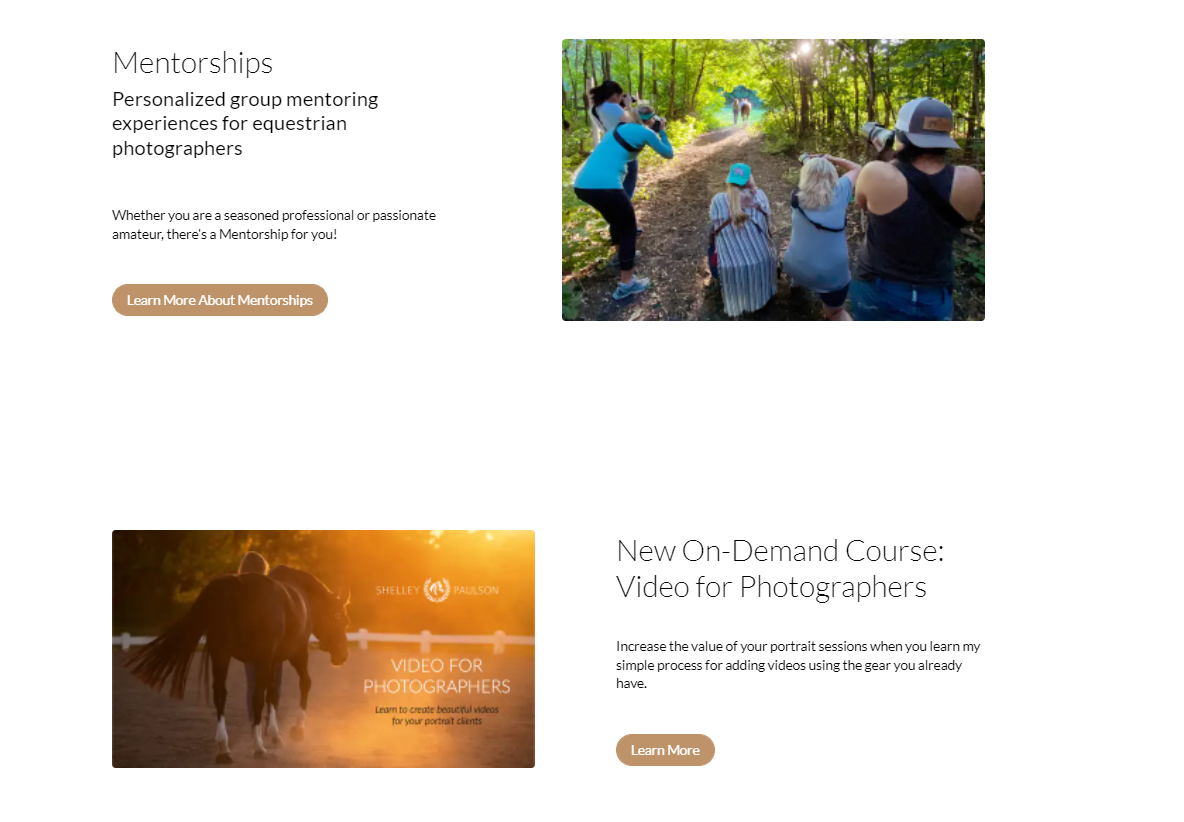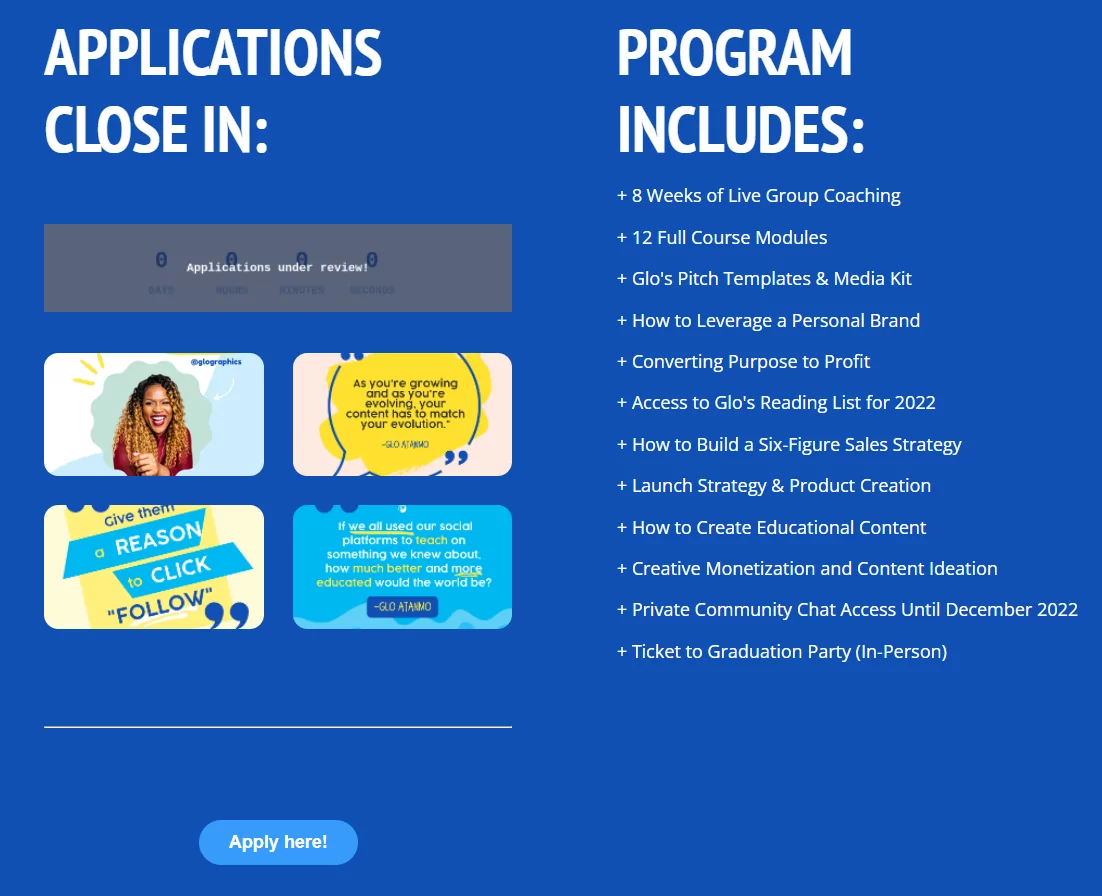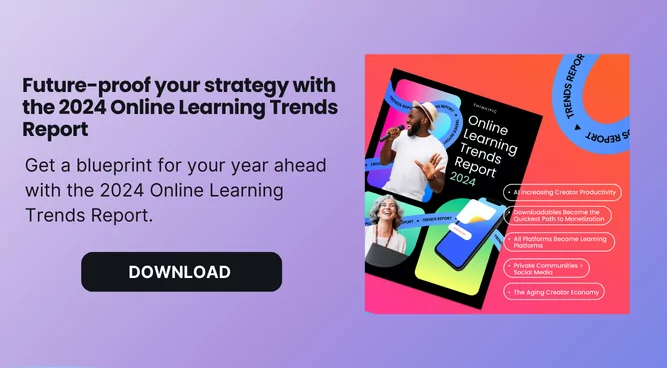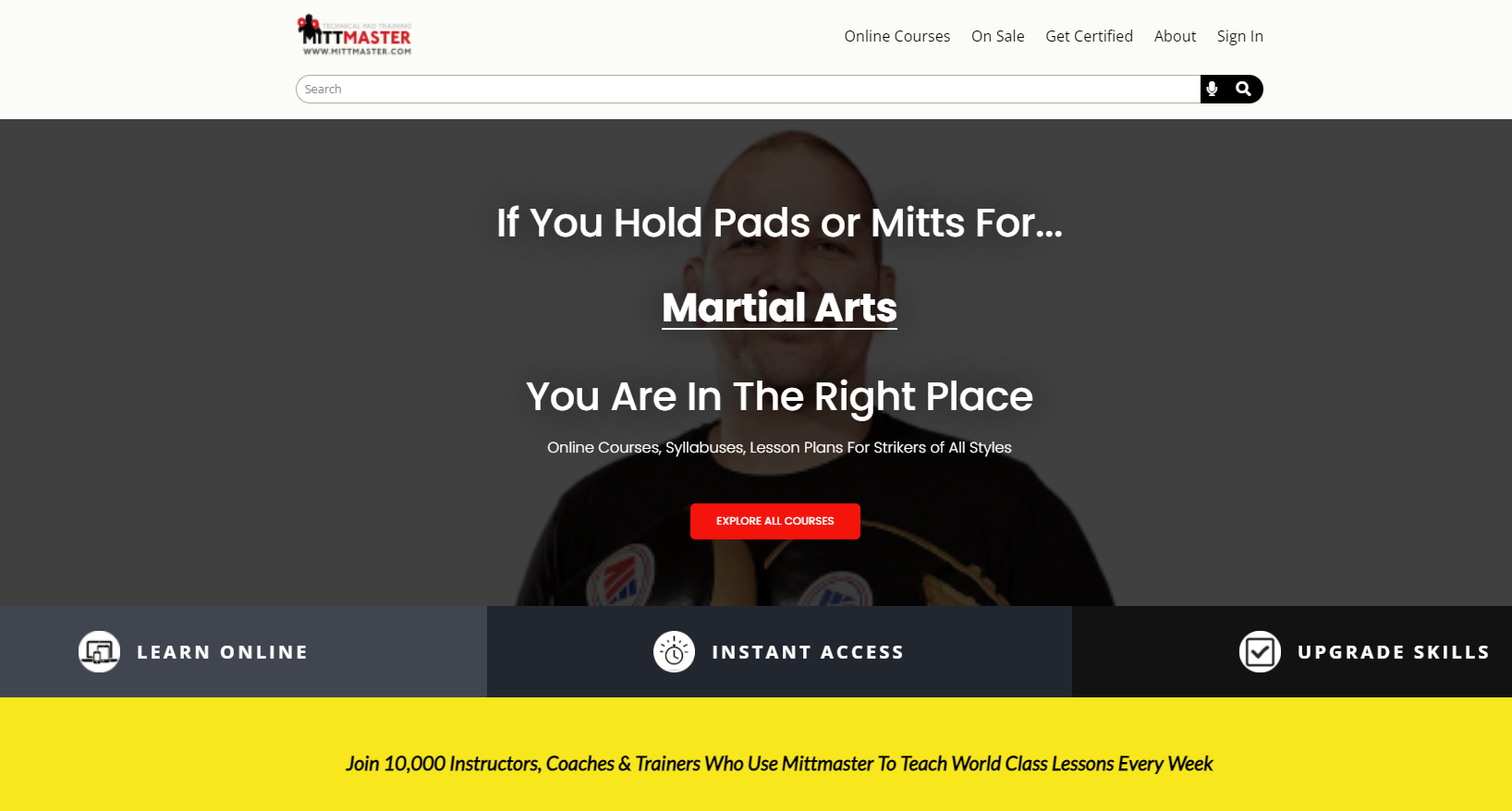What do a beauty vlogger, a TEDx speaker and a history podcaster have in common?
They’re all infopreneurs.
Infopreneurship is the top new way to be self-employed – but is it right for you? Here’s what you need to know about, how to be an infopreneur, what it involves and how to make money from your knowledge and expertise.
- What is an infopreneur?
- How to become an infopreneur?
- Successful infopreneur website examples
- Key qualities of an infopreneur
- Top benefits of becoming an infopreneur
What does “Infopreneur” mean?
An infopreneur is someone who sets up a business centered on gathering and selling information and expertise. Infopreneurs tend to work within specific niche markets, delivering targeted information on a particular topic or industry to their audience.
Infopreneurs create a body of content that can then be sold. Most infopreneurs start off as an expert or enthusiast in their chosen topic. They then convert their knowledge into content like online courses, podcasts, video tutorials, e-books and more.
Infopreneurs tend to work online, sharing and selling information digitally. However, infopreneurship has its roots in offline information sharing, such as mail order information products.
TL;DR Infopreneurs are part of the Knowledge Economy. They monetize their knowledge by selling info products, such as online courses or other digital products.
Infopreneurship definition
Infopreneurship is the practice of developing and selling information. Infopreneurship is a form of entrepreneurship specifically focused on monetizing your knowledge and expertise. Infopreneurship doesn’t require any formal training or experience – anyone can become an infopreneur with the right tools.
What does an infopreneur do?
A typical day as an infopreneur includes wearing many different hats. Meaning, infopreneurs collect, organize, market and sell information and this whole process requires a wide range of skills.
Some key tasks for an infopreneur include:
- Writing or filming educational content
- Continually engaging their audience, and understanding their niche to create info products that resonate
- Producing learning resources e.g. templates, workbooks and quizzes
- Creating marketing content e.g. social media posts and email marketing campaigns
- One-to-one calls with customers
- Administrative duties e.g. course enrollment and content uploading
- Website design and maintenance
- Facilitating workshops
- Brand partnerships e.g. guest blogs, podcasts and live events
What you do as an infopreneur will depend a lot on your niche, the size of your business and whether or not you outsource certain tasks. Like any entrepreneur, you’ll need to be comfortable adapting to take on different roles as your business grows and develops.
Read on to find out more about how to become an infopreneur by utilizing your existing knowledge and marketing it to potential learners.
How to become an infopreneur in 5 easy steps
Want to know how to become an infopreneur? Here are our 5 steps to get you started, plus tips from real-life infopreneurs on how to turn your knowledge and expertise into profit.
Choose your niche
The first step in how to become an infopreneur is to choose your industry or niche. Ideally, this will be an area that you already have knowledge and experience in. Think about what you want to become the “go-to” person for and pick a topic that you have a genuine interest in.
This is the most important part of your infopreneur journey as it will determine which direction you take with your products. Choose a niche that you will be able to commit to and that you will feel comfortable talking about, teaching and offering advice on.
A niche can be as broad or as narrow as you like but the more specific you can be, the easier you’ll find to market your info product – see step 5!
Shelley Paulson is one example of how specific a niche can be. She doesn’t just teach photography, she teaches equestrian photography. More on her here.
These articles will teach you how to find your niche and monetize your expertise.
Find a platform
Every infopreneur needs a platform for sharing their infoproducts and expertise. Select a platform that will allow you to easily monetize your knowledge, as well as monitoring your business’ progress.
Thinkific Plus makes infopreneurship easy with intuitive tools for creating an online course academy, including an online community space and features to make marketing and selling your products straightforward. There’s also a strong community of infopreneurs that you can lean on for help, advice and the answers to all your questions.
Collate your information
To become an infopreneur, you need to create a product – and that means collecting all the relevant information and turning it into something that people can buy.
Building an online course can take time but if you have existing content in the form of blogs, articles, e-books or social media content, you can utilize this content and repurpose it.
The same goes for in-person teaching – if you’re an educator, coach or tutor, you can recycle content from your lesson plans and tutorials and turn them into online materials. Think about what formats will work best for online learning and how you will make your course material engaging.
The Thinkific Blog is packed full of resources and information to help you.
Refine your learner experience
Once you’ve got the bones of your products mapped out, it’s time to refine and enhance your offering. To convince people to buy your product, it’s important to think about the learner experience and how you will engage students and improve customer retention.
Learning experience design
Learner experience is at the heart of any infopreneur’s success – you need to provide your customers with something of value to convince them to make a purchase and become loyal customers. If you’re new to infopreneurship, it’s a good idea to read up on learning experience design to help you create the best possible resources for your future students.
Creating an online learning community
As well as refining the learning experience design for your infoproducts, many infopreneurs also choose to create an online community around their brand. An online community can be a huge asset for your business, helping to improve the learning experience and increase revenue.
Some of the top benefits include:
- Lead generation
- Increasing conversions
- Creating a direct connection with customers
- Gathering feedback
- Crowdsourcing support for other learners
An online community increases the contact you have with customers, providing more opportunities to sell your products, gather feedback and improve learner support.
Learn more about how to build an online community here,
or dive into the world of Learning Communities.
Becoming a mentor
Another key task for most infopreneurs is becoming a mentor for learners in your academy. In the early days of infopreneurship, your business will need a hands-on approach to keep things running smoothly.
Being a mentor for learners includes answering their questions and potentially offering live or one-to-one tutorials. Taking an active role in the learning experience can help to enhance your course content and humanize your business, which in turn increases customer loyalty and boosts your retention rates.
Mentoring, Coaching, and Training are all great infopreneurship paths to take.
Of course, the secret to being a successful infopreneur isn’t just creating a product – it’s finding people who will buy it. This is the step that many infopreneurs struggle with.
To effectively market your products, it’s important to create a brand for your business. This means using multiple channels like social media, email marketing and webinars to get the word out. Focus on creating marketing content that’s relevant to your chosen niche to keep your marketing clear and targeted to your audience.
If you can create free resources that offer something of real value to your selected target audience, you can use your knowledge as a lead generation tool to entice future customers to engage with your brand.
For infopreneurs, it can be especially helpful to create a personal brand with yourself at the center. As you’re sharing your expertise, a personal brand can help to build trust with your customers by putting a friendly face on your business. This is also the route to expanding your infopreneur empire as you can quickly become a thought leader in your industry.
Learn How to market your online course, or check out our guide to creating a personal brand as an infopreneur.
Successful infopreneur website examples
If you want to learn how to be an infopreneur, take a look at these real-life examples of successful infopreneurs and exactly how they grew their businesses.
Mittmaster
Martial arts master Matthew Chapman was coaching martial arts for more than eight years before he turned to online teaching and became an infopreneur. Matthew decided to pivot his business and began producing online courses using Thinkific under his Mittmaster brand.
In the early stages of being an infopreneur, Matthew’s business didn’t perform as well as he‘d hoped. He struggled to market his course and attract learners. The change came when Matthew started utilizing Thinkific’s Order Bumps feature to market his courses, a tool that makes it possible to suggest complementary products to existing customers when they’re making a purchase.
With Thinkific, Matthew successfully increased customer loyalty for his brand, driving up revenue by as much as 50% simply by encouraging multiple purchases. With over 50 courses in his online academy, Matthew made his infopreneur venture a success and now he has the freedom to work when and where he wants.
Read the full Mittmaster case study here for more tips and inspiration.
Shelley Paulson Education
As an equine photographer, Shelley Paulson first turned to infopreneurship as a way to generate a passive income for her business. During her career as a commercial and editorial photographer specializing in horses, Shelley had grown a substantial audience on Facebook and Instagram – but she wasn’t making money from these channels.

In 2020, Shelley launched her first online course with Thinkific and generated over $35,000 in revenue. With two courses in the Shelley Paulson Education academy, Shelley is now able to give students a detailed insight into the world of equine photography, including camera settings, posing, editing, workflow and photography foundations. Shelley also offers an advanced Pegasus program which features online lessons, one-to-one coaching and a five-day in-person retreat for hands-on tuition where she shares her expert knowledge.
Infopreneurship has given Shelley the chance to make money while she’s out riding her horses, traveling and relaxing – and she’s got plans to grow her business even more.
Check out the full case study here to learn exactly how Shelley became an infopreneur.
Social Educator Academy
Glo Atanmo became an infopreneur with the launch of her Social Educator Academy on Thinkific that saw her level up her business and share her knowledge with more people than ever before.

Glo started as a blogger, growing her travel blog to generate a loyal following and brand community. She then went on to become a motivational speaker and creative educator featured in publications like Oprah magazine, Forbes, BBC and more.
Glo realized she had the potential to reach many more people and give something back to her community so she created an online course. She now teaches social educators how to use their social media to build a profitable brand and expand their reach. As an infopreneur, Glo offers a blend of live group coaching sessions, downloadable resources and an online learning community.
Since pivoting towards infopreneurship, Glo generates a seven-figure income simply by sharing her expertise in digital creation and storytelling.
Learn more about her incredible business here.
Launch your online learning product for free
Use Thinkific to create, market, and sell online courses, communities, and memberships — all from a single platform.

Key qualities of an infopreneur
Now you’ve seen examples of successful infopreneurs, it’s time to look at what it takes to be an infopreneur. We asked our Thinkific Community to share the key qualities you need to be a successful infopreneur and how to make money doing what you love.
Here are 5 tips to keep in mind.
- Embrace continuous learning
Any infopreneur needs to be knowledgeable on their chosen topic so that they can answer questions from learners and their community. An infopreneur’s work is never done – there’s always more to learn about your niche.
To make sure you keep on top of the latest developments, debates and challenges in your industry, it’s important to embrace continuous learning. This will not only help you deliver the best possible learning experience for your students, it also means you’re prepared in case you’re ever invited to speak on the topic.
It’s common for infopreneurs to appear on podcasts, webinars and live events so keeping your ears and your mind open to learn more on your topics related to your nice means that you’ll always be prepared for this eventuality.
- Be active and engaged
Infopreneurship offers you the chance to earn passive income from your expertise – but that doesn’t mean you don’t need to engage with your learners. Many infopreneurs find that the best way to grow their businesses is through active engagement with customers and students.
Engagement tactics include:
- Sharing community-generated content
- Providing additional bonus resources
- Offering one-to-one calls and live sessions
- Answering questions
- Asking for feedback
If you can show your customers that you’re engaged in their learning journey, you can build a more loyal customer base who are more likely to buy from you in the future and refer you to their friends.
- Unify your message
The easiest way to grow your business as an infopreneur is to have one clear message for your brand. Whatever marketing channels you’re using, you should aim to have the same message across every platform.
The benefit of having one key message is that it makes your brand easy to recognize and understand for potential customers. You will become known for that one message – and it is what customers will engage with at every touchpoint.
Having one key message also makes it easier for you to create content and marketing materials as you will have more focus and can repurpose content in different formats
- Partner with other brands
If you’re struggling to grow your business, brand partnerships are a brilliant strategy. No infopreneur is an island – work with other infopreneurs and businesses to spread the word about your business and your products.
Some effective brand partnerships include:
- Guest blogging
- Guest vlogging
- Guest appearances on podcasts
- Webinars and live speaking events
- Social media takeovers
- Influencer marketing
There’s a whole range of ways you can partner with other infopreneurs and brands to introduce your products to new audiences. Look out for infopreneurs in a similar niche and reach out to them – you’ll be surprised how effective this method can be!
- Be willing to fail
The path of an infopreneur is rarely a straight line. If you’re learning how to become an infopreneur, it’s important to appreciate that you might not find wild success with your first product. For many infopreneurs, it’s a trial and error process to find the products that your audience really want and are willing to pay for.
Becoming an infopreneur takes confidence and determination. Don’t give up if the path is bumpier than you first expected – stay open to feedback and be ready to adapt to the needs of your students and your community to find success.
Top benefits of becoming an infopreneur
Infopreneurship isn’t for everyone – but for those bold enough, it can come with a wide range of benefits. An infopreneur has more freedom, flexibility and autonomy than a regular employee.
Here are more of the top benefits:
- Uncapped earning potential
- Control over your work-life balance
- Work from anywhere
- Satisfaction and pride in your work
- Experience in a range of roles
If you can learn how to become an infopreneur, you can share your expertise with more people while gaining a range of benefits in return. Ready to try?
Launch your online learning product for free
Use Thinkific to create, market, and sell online courses, communities, and memberships — all from a single platform.

Do you have what it takes to be an infopreneur?
Infopreneurship isn’t right for everyone but with effective tools and a supportive community behind you, you can make your infopreneur dreams a reality.
To get started on your journey to becoming an infopreneur, try Thinkific today and start monetizing your knowledge and expertise.
Updated January, 2023 to include new eLearning Trends Report




